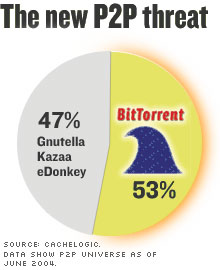 |
| BitTorrent is still the most popular peer-to-peer technology. Traffic levels are about the same today as they were a year ago. |
|
| More on Hollywood & piracy
|
|
|
|
|
|
|
|
|
NEW YORK (CNN/Money) -
BitTorrent has been described as Hollywood's Napster -- a sinister software that makes it easy to steal movies off the Internet. And just like the recording industry response to the Napster scourge years ago, movie studios today are determined to stamp out BitTorrent.
Vinton Cerf, one of the co-creators of the Internet, thinks Hollywood is making a big mistake and that BitTorrent or another technology like it can't be stopped. His advice to Hollywood: If you can't beat 'em, join 'em.
"It would be a mistake to think that because a particular technology can be used to distribute illegal copies therefore you should just run away from it," said Cerf, who helped design the architecture that underlies the Internet and current chairman of the Internet Corporation for Assigned Names and Numbers (ICANN), the private, non-profit group that essentially supervises the Web.
In fact, Cerf said he knows Hollywood producers who are considering ways to use BitTorrent to distribute movies or other content online. He did not provide any names, but described the interest as "serious."
"Nobody has made any commitments," continued Cerf. Given the huge stakes involved, the producers are moving cautiously, he said.
The incipient interest in effectively embracing the enemy comes at a critical time for Hollywood,
The movie industry, claiming that billions worth of sales are lost to DVD and online piracy every year, has mounted a high-profile and multi-thronged campaign against so-called "peer-to-peer" networks, a technology that allows Internet users to trade songs, movies, video games, and photos stored on their hard drives.
Stopping the unstoppable
Together the movie and music industries have sued thousands of peer-to-peer users. They're asking the Supreme Court to give them standing to sue peer-to-peer developers. They're lobbying Congress to enact stiffer piracy penalties.
The movie industry faces an uphill climb. Data from tracking firm CacheLogic show that BitTorrent usage levels -- about half of all peer-to-peer traffic -- have not changed since the Hollywood onslaught began late last year.
But BitTorrent is not a company, it's a technology. And when one site shuts down, another instantly takes its place.
Briefly, here's how it works: users download from BitTorrent.com or some other site what's known as a '.torrent file' which also contains a link to a "tracker." This tracker basically allows users to find files, whether it's a movie or an operating system or a video game.
The beauty of BitTorrent is, the more people who download a file the better. Mass downloading essentially accelerates the process instead of slowing it down. As a result, instead of taking a full day, a movie download can happen in a matter of hours.
"BitTorrent makes Hollywood nervous the way Napster made the recording industry nervous," said Michael Goodman, an analyst with the Yankee Group.
But Goodman and other industry analysts think Hollywood has only one choice: embrace BitTorrent or a technology like it.
"One of the lessons we've certainly learned is you can't stem the technology tide," explained Goodman. "Peer-to-peer networks are here to stay and that begs the question, 'How do you live and work with them rather than let them be a source of piracy?'"
Some companies are looking for ways to use BitTorrent or similar technology.
The British Broadcasting Corporation is designing a peer-to-peer network where users can get free access to all the U.K.-based company's programs. On Wednesday, Netscape pioneers Mike Homer and Marc Andreessen launched the Open Media Network, a similar site that contains television shows, radio programs, movies and other content that their creators are willing to give away without cost.
Both the BBC project and the Open Media Network are based on a technology called Kontiki, which is like BitTorrent in that it allows participants to share unused bandwidth on their computers and servers.
A brief case study
One company that uses BitTorrent is Linspire, a San Diego-based developer of the Linux operating system. Linspire uses BitTorrent to distribute its products and minimize demand on company servers, said CEO Kevin Carmony.
He estimates the company saves about $20,000 a month, or half its bandwidth costs, using BitTorrent. "We love it and customers love it because it's a faster download," said Carmony.
Can BitTorrent be used to steal Linspire software? Carmony shrugs. "Of course it can and of course it will," he said. "There's no form of copyright protection that can't be broken."
Andrew Parker, the co-founder and chief technology officer at CacheLogic, thinks it's only a matter of time before Hollywood accepts that there is no "magic bullet" to combat peer-to-peer piracy and then starts to embrace it.
"I'm not sure they understand it enough yet," said Parker.
A spokeswoman for the Motion Picture Association of America, the movie industry group leading the anti-piracy campaign, did not return phone calls seeking comment.
Want to read about other breaking business news? Click here.
What's up in the world of technology? Click here.

|